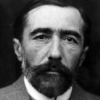Joseph Conrad

Joseph Conrad
Joseph Conradwas a Polish-British writer regarded as one of the greatest novelists to write in the English language. He joined the British merchant marine in 1878, and was granted British nationality in 1886. Though he did not speak English fluently until he was in his twenties, he was a master prose stylist who brought a non-English sensibility into English literature. He wrote stories and novels, many with a nautical setting, that depict trials of the human spirit in the midst...
NationalityPolish
ProfessionNovelist
Date of Birth3 December 1857
CountryPoland
I always went my own road and on my own legs where I had a mind to go
I -- I alone know how to mourn for him as he deserves.' But while we were still shaking hands, such a look of awful desolation came upon her face that I perceived she was one of those creatures that are not the playthings of Time. For her he had died only yesterday. And, by Jove! the impression was so powerful that for me, too, he seemed to have died only yesterday -- nay, this very minute. I saw her and him in the same instant of time -- his death and her sorrow -- I saw her sorrow in the very moment of his death. Do you understand? I saw them together -- I heard them together.
I had no particular desire to enlighten them, but I had some difficulty in restraining myself from laughing in their faces, so full of stupid importance.
Life knows us not and we do not know life—-we don’t know even our own thoughts. Half the words we use have no meaning whatever and of the other half each man understands each word after the fashion of his own folly and conceit. Faith is a myth and beliefs shift like mists on the shore; thoughts vanish; words, once pronounced, die; and the memory of yesterday is as shadowy as the hope of tomorrow
There is no peace and no rest in the development of material interests. They have their law, and their justice. But it is founded on expediency, and is inhuman; it is without rectitude, without the continuity and the force that can be found only in a moral principle.
He hated all this, and somehow he couldn't get away.
Vanity plays lurid tricks with our memory.
And this also," said Marlow suddenly, "has been one of the dark places of the earth.
That faculty of beholding at a hint the face of his desire and the shape of his dream, without which the earth would know no lover and no adventurer.
It is when we try to grapple with another man's intimate need that we perceive how incomprehensible, wavering, and misty are the beings that share with us the sight of the stars and the warmth of the sun.
Don't you forget what's divine in the Russian soul and that's resignation.
Going home must be like going to render an account.
The discovery of America was the occasion of the greatest outburst of cruelty and reckless greed known in history.
Analytical philosophy was very interesting. It always struck me as being very interesting and full of tremendous intellectual curiosities. It is wonderful to see the mind at work in such an intense manner, but, for me, it was still too far removed from my own issues.